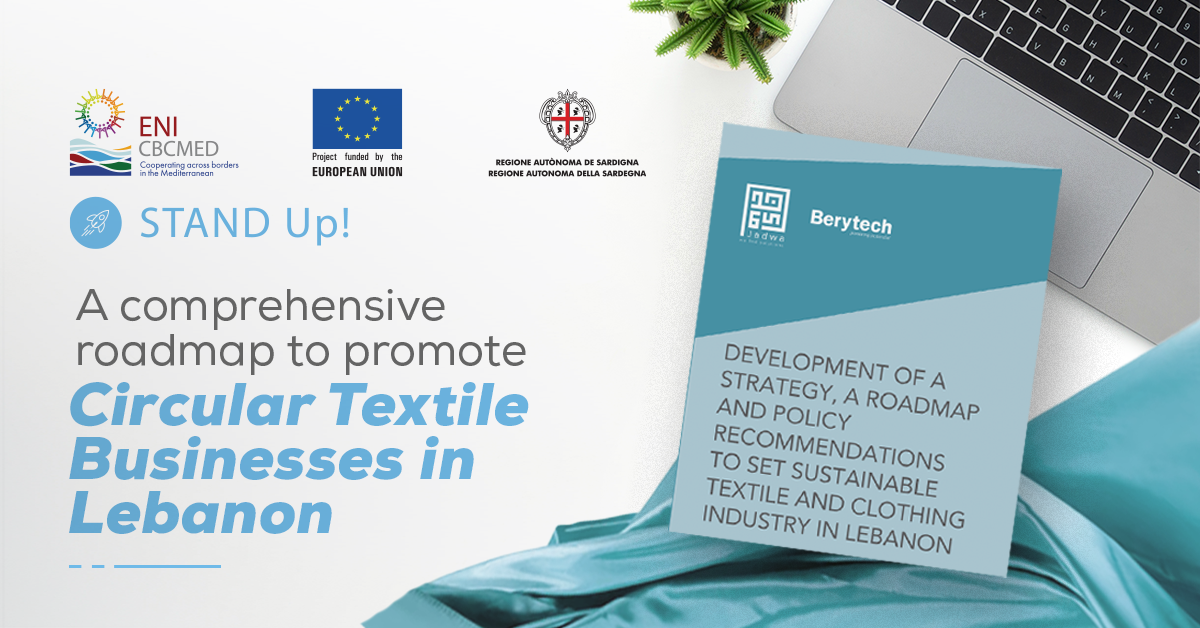Berytech, in collaboration with Jadwa Consult, is on a mission to shape Lebanon’s sustainable textile and clothing sector through policy-driven eco-innovation aligned with circular economy principles and has developed a textile policy paper serving as a strategy, roadmap, and policy recommendations to set sustainable textile and clothing industry in Lebanon.
The policy paper falls under the STAND Up! project funded by the ENI CBC Med simultaneously implemented in 2 of the partner countries: Egypt and Tunisia to boost scalable, inclusive circular economy textile ventures, fostering innovation, technology transfer, and sustainable job creation for youth and women.
Objectives of the Policy Paper
The purpose of the paper is to provide an understanding of the textile and clothing sector and recommendations for improving local ecosystems. In addition, it will foster the development of textile startups with environmental and social goals to promote sustainable production and consumption patterns in this industry in the Mediterranean region. The policy paper’s main objectives are:
- Mapping the stakeholders of the textile, fashion, and clothing sector in Lebanon.
- Getting to know the state of the art of Circular Economy and decarbonization legislation and initiatives affecting the development of circular textiles in Lebanon.
- Identifying the main challenges and opportunities that are facing circular textiles businesses and start-ups and their ecosystem to develop their ventures.
- Emphasizing the need to promote transformations on the governmental and political level in the Mediterranean area to support the entrepreneurial network in adopting environmental and social improvements in the textile and clothing sector.
Overview and Mapping of the textile and clothing industries in Lebanon
Lebanon’s Textile and Clothing sector heavily relies on its top ten product exports, with over 70% of exports going to key destinations, including the European Union, GCC countries, Jordan, Syria, Turkey, and Iraq. The sector leans on imports to meet apparel demand due to limited domestic production capacity, facing challenges like high costs and foreign competition with low import duties. Major sources of apparel imports are China, Turkey, EU nations, Bangladesh, and India. Partial Equilibrium (PE) modeling shows a modestly positive impact of the Association Agreement, especially benefiting the wearing apparel sector with an expected EUR 33 million increase in imports and EUR 12 million in exports.
The textile industry encompasses various stakeholders, from raw material suppliers to consumers, shaping its operations and impact. These stakeholders, including raw material suppliers, textile manufacturers, retailers, consumers, government bodies, and non-governmental institutes, collectively influence the industry’s dynamics, addressing challenges such as sustainability and labor rights. In Lebanon, 873 players represent key stakeholder categories: Manufacturers, Traders, Government, and Non-Governmental Institutes.
To identify the challenges and opportunities facing manufacturers, traders, and startups, a survey was conducted with 100 participants covering all categories of the sector’s stakeholders in addition to interviews with experts to determine their point of view on these issues. Moreover, a synergy workshop was organized for stakeholders and experts to learn more about challenges and opportunities.
Strategy Adoption and Implementation
This comprehensive roadmap aims to promote circular textile businesses in Lebanon through a multifaceted approach involving various stakeholders:
Government & Policy Makers:
Create a regulatory framework promoting circular textiles with recycling laws and incentives for startups and manufacturers in Lebanon. Revise tax regulations, particularly for second-hand textiles. Partner with waste management and municipalities to ensure efficient textile waste collection and processing. Regulate textile factories for effective waste management and prohibit harmful dyes and textiles.
Chamber of Commerce (Access to Markets):
Promote industry recovery, explore new markets, and participate in trade events to boost startup visibility — Foster international collaborations for circular textile knowledge sharing. Offer manufacturer capacity building with training, affordable design academies, and a focus on marketing and sustainability. Facilitate large-small business partnerships for skill development and project opportunities.
Manufacturers:
Drive Innovation and Collaboration: Promote innovation with government, university, and business support for efficient circular textile tech. Create textile business hubs through partnerships to foster collaboration and innovation in startups.
NGOs:
Raise Circular Textile Awareness: Conduct public awareness campaigns, educational initiatives, and partnerships with businesses and organizations to educate people about the environmental and social benefits of circular textiles, encouraging responsible consumption.
International Organizations:
Facilitate Access to Finance: Provide grants, subsidies, and low-interest loans to support the growth and expansion of circular textile startups and businesses, especially those adopting new technologies and upgrading machinery. Encourage investment in circular textiles through venture capital and impact investing.
Considering these findings, we recommend a roadmap for promoting the Circular Economy in Lebanon’s Textile and Clothing sector over the next three years (2024-2027). This roadmap aims to reduce the environmental impact of the clothing and textile sectors, generate employment, and build a more sustainable future. The vision is to establish a thriving circular economy where resources are maximized, and waste is minimized in Lebanon’s textile and clothing sector.
Click here to download and navigate the Policy Paper for a sustainable textile and clothing industry.










